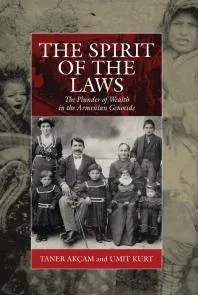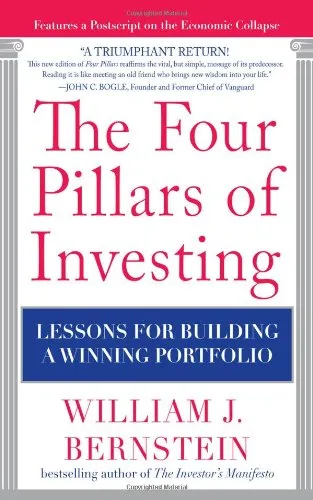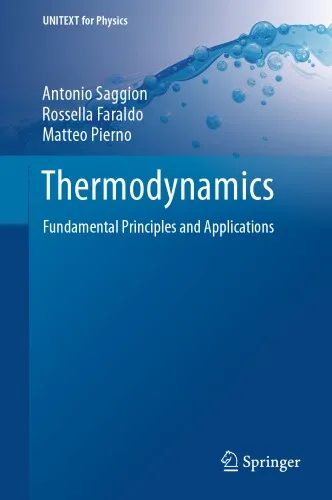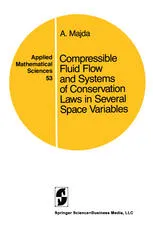The Spirit of the Laws : The Plunder of Wealth in the Armenian Genocide
4.4
بر اساس نظر کاربران

شما میتونید سوالاتتون در باره کتاب رو از هوش مصنوعیش بعد از ورود بپرسید
هر دانلود یا پرسش از هوش مصنوعی 2 امتیاز لازم دارد، برای بدست آوردن امتیاز رایگان، به صفحه ی راهنمای امتیازات سر بزنید و یک سری کار ارزشمند انجام بدینکتاب های مرتبط:
کتاب 'The Spirit of the Laws : The Plunder of Wealth in the Armenian Genocide' نوشته تانر آکچام و امید کورت یک اثر برجسته در بررسی جنایات تاریخی و تاثیرات اقتصادی و اجتماعی آنها است. این کتاب به طور دقیق به تحلیل غارت ثروت در جریان نسلکشی ارامنه میپردازد و با رویکردی حقوقی و تحلیلی ما را با جنبههای مختلف این فاجعه آشنا میسازد.
خلاصهای دقیق از کتاب
این کتاب به بررسی سیستماتیک عملیات غارت و تاراج اقتصادی که در خلال نسلکشی ارامنه صورت گرفت، میپردازد. نویسندگان از اسناد تاریخی و آرشیوی استفاده کردهاند تا نشان دهند چگونه قوانین و مقررات آن زمان به ابزاری برای تصاحب اجباری داراییهای جامعه ارمنی تبدیل گشتند. در این فرآیند، نقش دولت عثمانی و نهادهای اجرایی در تحقق پروژههای غارتگری به شکلی گسترده موشکافی شده است.
یادداشتهای کلیدی
یکی از پیامهای کلیدی این کتاب این است که قوانین و سازوکارهای حقوقی میتوانند در خدمت جنایتکاران علیه بشریت قرار گیرند و به عنصری در خدمت اجرای سیاستهای خصمانه بدل شوند. دیدگاههای تاریخی ارائه شده نشان میدهد که چگونه مفهوم حقوق در خدمت استیلای اقتصادی و سیاسی درآمده و عاملیت در نسلکشی را توجیه میکند.
جملات معروف از کتاب
- «قانون، وقتی که در دست قدرتطلبان قرار گیرد، میتواند به ابزاری در خدمت تاراج و نابودی تبدیل شود.»
- «این نسلکشی تنها به نابودی یک جامعه منجر نشد بلکه ساختار را از درون پوساند.»
چرا این کتاب مهم است
کتاب 'The Spirit of the Laws' برای فهم بهتر تاریخ و فاجعههای انسانی بینهایت ارزشمند است. اهمیت آن در بازگشایی نقش قوانین در پروژههای نسلکشی و نشان دادن مسیرهای ممکن جهت جلوگیری از تکرار چنان فجایعی برجسته است. این اثر به دانشجویان حقوق، تاریخ و علوم سیاسی ابزارهای نوینی برای تحلیل عملکرد قدرتهای استعماری و قوانین حاکم ارائه میدهد و فرصتی برای بازنگری در تعامل حقوق و قدرت و اثرات آن بر جوامع فراهم میسازد.
در نهایت، مطالعه این کتاب امکان بررسی دقیقتر و جامعتر از یکی از تراژدیهای بزرگ قرن بیستم را فراهم میکند و به شکلی بدیع ما را به بازاندیشی در مورد نقش قوانین و نهادهای دولتی در رخدادهای مشابه در سراسر جهان دعوت مینماید.
Introduction
The Armenian Genocide stands as a grim testament to the extremes of human cruelty, marking one of history's darkest chapters. "The Spirit of the Laws: The Plunder of Wealth in the Armenian Genocide" delves deep into the systematic economic disenfranchisement and plunder that accompanied the physical annihilation of the Armenian people in the Ottoman Empire during World War I. Authored by Taner Akçam and Ümit Kurt, this book meticulously uncovers the complex interplay of laws, bureaucratic measures, and social dynamics that facilitated the economic aspect of the genocide, revealing it as a pivotal component of genocidal processes.
Detailed Summary of the Book
The book unfolds against the backdrop of the Ottoman Empire's deteriorating condition in the late 19th and early 20th centuries. As the empire faced existential threats, it conceived policies that targeted the minority Armenian population under the guise of national security. However, beyond mass deportations and killings, there existed a more insidious motive—economic enrichment through the confiscation of Armenian properties and wealth.
The narrative explores the legal and administrative frameworks that were instrumentalized to legitimize and facilitate the seizure of Armenian properties. These included provisional laws, decrees, and local governance practices that were adapted to ensure the thorough plunder of the Armenian community's wealth. This plunder was not an anomalous by-product of wartime chaos but a well-orchestrated scheme that involved various layers of society—from government officials to local actors who saw opportunities to enrich themselves.
Akçam and Kurt meticulously chart these processes, drawing from primary sources such as state archives, undercover communications between officials, and survivor testimonies. The authors provide an illuminating account of how the displacement of Armenians was considered incomplete without the destruction of their capacity to return or rebuild—achieved through economic dispossession.
Key Takeaways
- The Armenian Genocide encompassed not only physical annihilation but also economic plunder.
- Legal mechanisms played a critical role in facilitating the expropriation of Armenian properties.
- Understanding the economic dimensions of the genocide provides a more comprehensive view of the events.
- The genocide had lasting impacts on the socio-economic landscape of the region.
Famous Quotes from the Book
"The Armenian Genocide was not merely a crime against humanity but a crime against a people's right to wealth, property, and self-sustenance."
"The silence around the economic plunder of the Armenians is one of history's most enduring injustices."
Why This Book Matters
This work is a seminal contribution to genocide studies, adding depth to our understanding of the Armenian Genocide's comprehensive impact. By focusing on the economic dimensions, Akçam and Kurt challenge the conventional narratives that often overlook the interconnectedness of material destruction and mass violence. The book serves as an essential resource for historians, legal experts, and anyone interested in the broader implications of genocidal processes. It offers critical insights into how displacement and disenfranchisement are utilized as tools of genocide, underscoring the need for recognition and justice for the Armenian community's suffering.
دانلود رایگان مستقیم
شما میتونید سوالاتتون در باره کتاب رو از هوش مصنوعیش بعد از ورود بپرسید
دسترسی به کتابها از طریق پلتفرمهای قانونی و کتابخانههای عمومی نه تنها از حقوق نویسندگان و ناشران حمایت میکند، بلکه به پایداری فرهنگ کتابخوانی نیز کمک میرساند. پیش از دانلود، لحظهای به بررسی این گزینهها فکر کنید.
این کتاب رو در پلتفرم های دیگه ببینید
WorldCat به شما کمک میکنه تا کتاب ها رو در کتابخانه های سراسر دنیا پیدا کنید
امتیازها، نظرات تخصصی و صحبت ها درباره کتاب را در Goodreads ببینید
کتابهای کمیاب یا دست دوم را در AbeBooks پیدا کنید و بخرید














